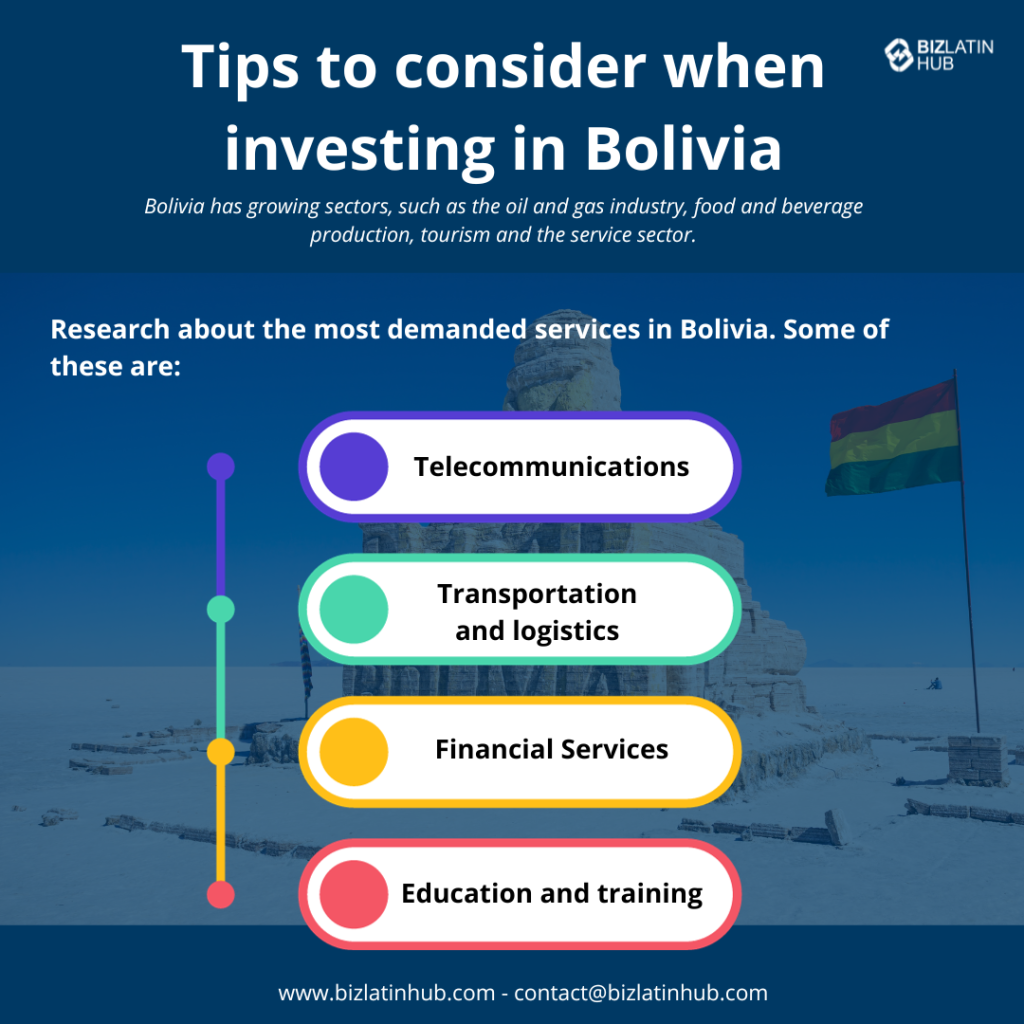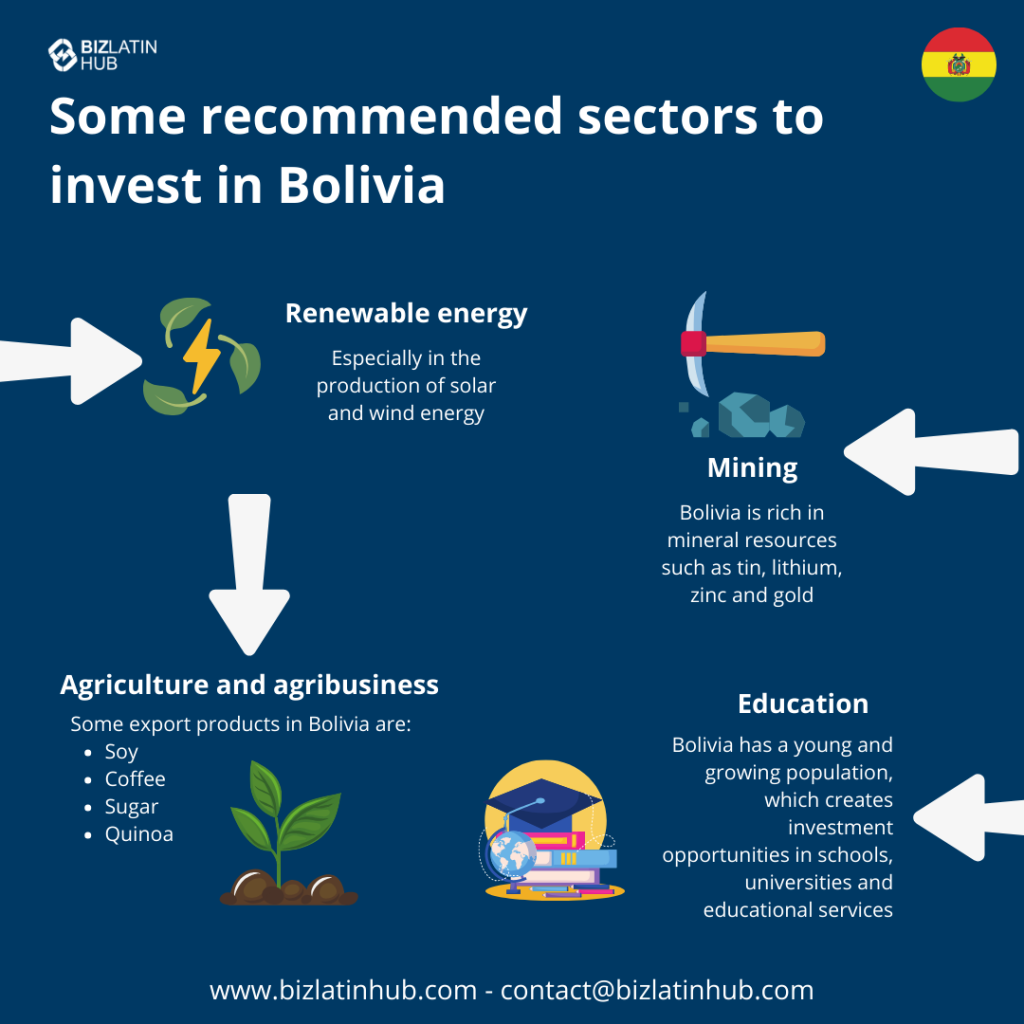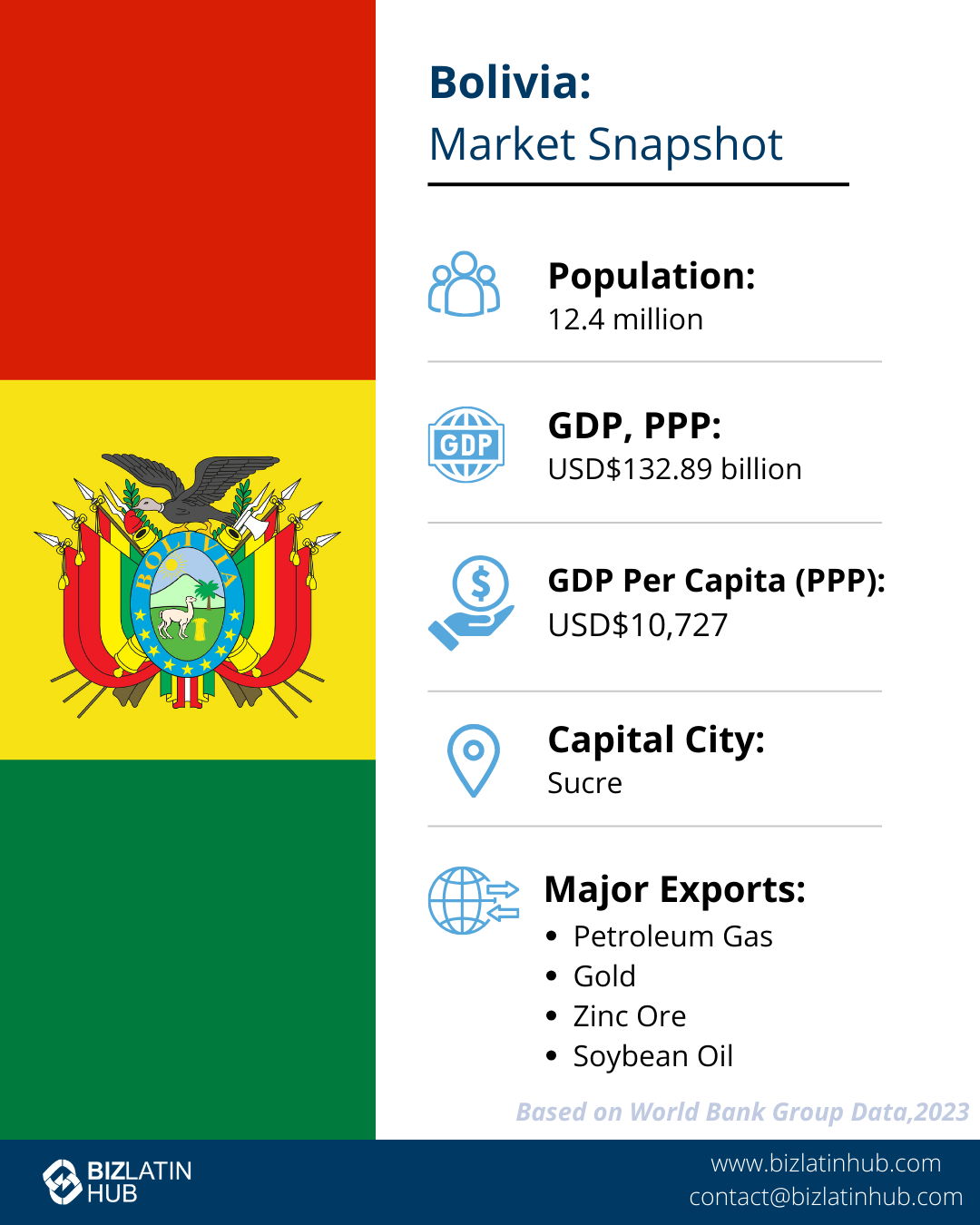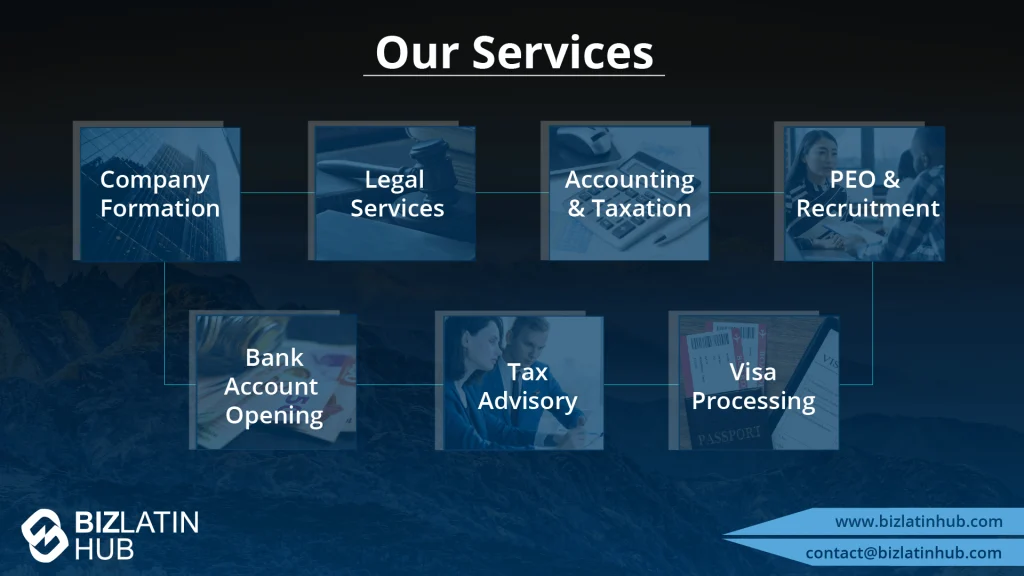In recent years, Bolivia has been working on highlighting its strengths to attract foreign investors. The country aims to achieve legal certainty and clarity, and balance macroeconomic, political and social stability.

Bolivia makes it quite clear that the country needs investment, and not bosses. The government explains that the investors obviously will take their profits, but regulations aim to keep some revenues and dividends in Bolivia for the purpose of boosting the economy, especially the hydrocarbon, electricity or mining area.
According to the U.S. Department of State, foreign direct investment reached $440 million in 2021, which rose significantly from 2020 when the country registered a divestment of $1,018 million. This boost fed into the country’s economic growth, mainly through the increase in reinvestment of profits. Gary Rodríguez, General Manager of the Bolivian Institute of Foreign Trade (IBCE), identified that natural resources are a strong attraction for foreign capital; with hydrocarbons, the manufacturing industry, and commerce representing over 80% of the total FDI.
As Bolivia surfaces on foreign investors’ radars, we outline some profitable business opportunities offering long term commercial success in the Latin American country.
Investment opportunities in Bolivia: Financial technology (fintech)
The finance world is ballooning with the introduction and momentum of technological innovation, creating a vast range of opportunities in fintech. Like many of its regional counterparts, Bolivia hasn’t fully explored its fintech potential. Jorge Velasco, a financial analyst, says that while the financial system to support an immense volume of business – in portfolio, public deposits and transference – the emergence of new companies or startups specializing in financial technology is a very interesting investment opportunity.
Currently, high financial regulation in Bolivia could slow the speed of innovation, challenging the patience of fintech startups. However, again like many governments in the area, Bolivia’s policymaking and legislative changes inevitably move slower than the rate technological innovation of financing platforms. Judging by the response to fintech more generally in Latin America, it may only be a matter of time before more rigorous legal framework is implemented to enable businesses to fill the gaps in Bolivia’s fintech market.
Buildings and construction
The government honed in its focus on Busch Port (located on Canal Tamengo), having signed a strategic alliance for the construction of major port facilities in 2019. The public-private alliance included a public investment of US$250 million. Bolivia’s waterways at the time carried around US$1.2 billion worth of soybeans, grains, and sunflower oils and derivatives. Bolivia continues developing ways to build on this transport system.

This generates an opportunity for the contractors to win projects in the construction-administration of barges, storage facilities for mineral exports, rail and road infrastructure to support such an immense operation. The various projects encompassing the strengthening of Busch Port were expected to take around 4-5 years to undertake – particularly the groundwork for rail and roads – and it is still currently under construction.
Beneficially, once established this port and its corresponding rail projects will connect landlocked Bolivia with the Atlantic Ocean and strengthen established export channels to regional partners. The government, upon signing the alliance, estimated an investment influx of around US$700 million in the following five years as a result of this construction work. Chinese investors are already making the first moves by building a steel mill in El Mutún, a town where Bolivia exports processed iron. This project had reached a 69% completion rate by March 2023 and is estimated to be completed by 2024.
Bi-oceanic Corridor
Busch Port isn’t the only location getting a makeover. The Bolivian government is backing an agreement with Brazil, Paraguay and Peru to build a railway connecting the Pacific and Atlantic Oceans, with Peru’s Ilo port and Brazil’s São Paulo as final destinations. The main line will pass through La Paz and Santa Cruz in Bolivia.
In June 2018, the 4 governments met and agreed on regulatory framework to support this project. This railway will be around 3800 kilometers long, and carries a price tag of around US$10 billion. As of 2023, the Bolivian government has contemplated an investment of $2.7 million in order to determine the locations of the different stations.
Such a significant opportunity for external contractors should not be ignored. Not only will this line pass through several countries, but minor railway routes are expected to feed off the main line. Construction companies could expect to be in business in Bolivia for many years to come, should they win a contract with Bolivia for this project.
Health sector
The government is planning on building several hospitals and this will attract several projects and ventures. Further construction bids will be available in this space. Additionally, flow-on effects from newly established health facilities include the chance for businesses to:
- Provide training services to new health professionals
- Import and on-sell health and medical equipment
- Offer peripheral services to new health facilities, such as storage/handling, transport, communications and software.
Real estate
It is well known that Santa Cruz de la Sierra is the second most profitable city in the real estate segment in South America, according to residential sales and leasing site Infocasas. It shows an average annual profit that fluctuates between 6 and 8% for real estate owners.
The private construction sector‘s growth rate is expected to stabilize at a rate of 4.7% from 2023 to 2026, making residential and other private construction another profitable option for investors. As of 2022, 58% of Bolivians live in “slum” housing and only 49% of houses in Santa Cruz have access to proper sewerage systems. Finding innovative ways to offer housing and solve other real estate quandaries – such as shared office space for small businesses – can draw in large financial returns for investors looking at large-scale projects.

Growth in Bolivia
The Gross Domestic Product (GDP) of Bolivia grew 3.6% in 2022, promoted by the increase in non-extractive, labor-intensive activities and domestic demand, according to the National Statistics Institute of Bolivia.
In 2020, the agricultural activity experienced a growth of nearly 2%, making an important contribution to the country’s GDP. This was emphasized by the cultivation of sugar cane that reached a record high of 56,060 kg/ha in the same year, due to the demand of the sugar and the alcohol in the manufacturing industry.
In 2018, national financial establishments grew 5.3% thanks to the application of the Financial Services Law, which allowed greater access to productive loans and housing of social interest, according to the state entity.
Bolivia’s export picture
Bolivian exports registered a growth of 22.6% between 2020 and 2021, valued at a total of $178 million dollars. The country’s strong export market is a significant drawcard for foreign investors and businesses.
In 2021, Bolivia’s main exports were gold ($2.55 billion), petroleum gas ($2.25 billion), zinc ($1.38 billion), silver ($869,888 million), and soybean flour ($709,954 million). Its main export destinations were India ($1.85 billion), Brazil ($1.45 billion), Argentina ($1.043 billion), Japan ($917 million) and Colombia ($714 million). With a diverse portfolio of trading partners, Bolivia opens doors for businesses looking to send their goods offshore and want to diversify their export destinations.
Bolivia is an emerging market in Latin America, often overshadowed by its high-performing neighbours and regional powers such as Brazil and Mexico. However, this only serves to position Bolivia as an up-and-coming investment destination, not yet saturated by major players who are instead moving into bigger neighbouring markets.
Explore investment opportunities in Bolivia with Biz Latin Hub
Like many others, we’re watching Bolivia’s progress as it steadily moves towards greater economic prosperity. The newness of Bolivia’s investment potential means that some processes and legal requirements for setting up a business and operating in or with Bolivia are difficult to navigate. For this, we recommend seeking local expertise and support to get your business off the ground.
Biz Latin Hub has been operating within Latin America since 2014. With offices in 18 countries in the region, our team of local and expatriate professionals possess the expertise and depth of understanding you’ll need to enter Bolivia’s market.
We offer tailored business solutions in market entry and back-office services to ensure your company gets the best possible start in a new environment. For more information about how we can help with your Bolivian expansion, contact us today here at Biz Latin Hub.
Learn about our team and expert authors.






